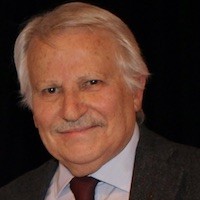News
Obituary-Barry May, founder of The Baron
Monday 3 June 2024

Barry May, who died on June 1, aged 80 after a brave struggle with cancer, had a distinguished career around the globe with Reuters; but perhaps his greatest achievement came after he left, when he founded The Baron website.
May’s life was crammed with multiple roles and achievements after his retirement from Reuters following a 32-year career that took him from Johannesburg to Pakistan, the United States and to his most senior correspondent role as Gulf Bureau Chief.
He will probably be best remembered by his former colleagues for founding The Baron, which he invented and edited with huge commitment over 15 years, keeping old hacks and other Reuters staff connected, and creating an invaluable online community. Friends say May spent two or three hours almost daily working on the website, including when he was on holiday. He also spent many hours and weeks commissioning and then mastering the online editing system.
Even in his final months, Barry showed extraordinary strength and bravery to continue overseeing The Baron.
He came up with the idea for the website when he heard of the death of a retired colleague and friend and found there was no effective way to get such news in a timely way to the Reuters family, in all its divisions, around the world.
The many tributes paid to Barry, when it was announced last year that he was stepping down as editor on health grounds, speak volumes about The Baron's impact.
May, the son of a pianist, left school in 1959 and started as a tea boy at the Scotsman newspaper’s office on the corner of Fleet Street and Ludgate Circus.
For the next few years he worked for a number of local papers, including a year at a music magazine. At the age of 19, he wrote the first published review of the then little-known Rolling Stones when he saw them playing at a rhythm and blues club in Richmond, southwest London, in 1963. The last line of Barry's full-page review, published in the Richmond & Twickenham Times, read prophetically: "The Rollin’ Stones (their original name) will go on rollin’”. His article helped propel them to fame.
He joined Reuters from the AP in 1968 and his first posting was Johannesburg.This was followed by a year in Pakistan -- a lonely assignment but one which left him with a deep interest in the Raj -- and later on the United States, where he worked for six years in New York and Washington.
Shortly after the States, Barry was sent on a fireman stint to Iran following the downfall of the Shah. Together with two other Reuters reporters, Alan Philps and Phil Davison, he was expelled in July 1981 by the Ayatollah Khomeini regime, which objected to their reporting.
He was the UK parliamentary lobby correspondent in the early days of Maggie Thatcher and worked for six years in Corporate Relations, where he was manager of internal communications and editor of the Reuters World house magazine, which won several industry awards on his watch.
May’s later career years included a lengthy stint as Gulf Bureau Chief, based in Dubai, and heading a revamped Business Unit in London, where he was founding editor of the Reuters Business Report in Europe.
On retirement in 2000, Barry plunged into a multitude of interests in addition to The Baron.
He played a leading role for 10 years on the board of the Reuters Pension Fund and was a committee member of the Reuter Society. He was a fellow of the Royal Society of Arts. In 2014 he was admitted as a Liveryman of The Worshipful Company of Stationers and Newspaper Makers, founded in 1403, which is now the City of London guild for modern communications industries. He was granted the Freedom of the City, and duly took part in herding a flock of sheep over Blackfriars Bridge.
For five years he was chairman of the Richmond Society in his hometown, where he was well known, and wrote information boards explaining the history of local sights.
He leaves his wife Dolly, sons Siva and Rama, and a brother, Graham. ■
- « Previous
- Next »
- 36 of 2177